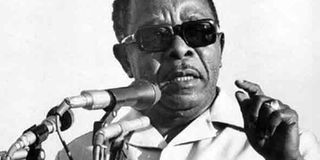Aboud Jumbe: He dared and paid the price

What you need to know:
At a stroke of the pen, he lost his positions as Chairman of the Zanzibar Revolutionary Council, CCM Vice Chairman, Zanzibar President and Vice President of Tanzania
Arusha. Aboud Jumbe Mwinyi was a vibrant politician in the 1970s, especially after he succeeded Abeid Amani Karume as the new Zanzibar leader.
A graduate of Makerere, the academic Mecca of yesteryears in East Africa, Jumbe was holed up in the powerful Zanzibar Revolutionary Government since January 1964.
Jumbe before the assassination of Karume on April 7, 1972, was the minister of state responsible for Union Affairs, a position which made him closer to the Union government.
His rise to succeed the slain Zanzibar leader is not very clear but apparently Mwalimu Julius Nyerere, the then Union President, might have had a hand.
Unlike his rather autocratic predecessor, he started visiting the Mainland regions and during one of his visits to the southern regions, he said he had traced his origins in Mbinga District, Ruvuma Region.
Sooner or later Jumbe started to represent Mwalimu in official state visits and important regional leaders’ meetings which Mwalimu could not make as he (the latter) was much preoccupied by settling people in Ujamaa villages or the liberation struggle in Africa.
Jumbe was to later to easily accept Mwalimu’s proposal to merge Tanu, the independence party of the Mainland and the Afro-Shirazi Party (ASP) which ruled Zanzibar. He automatically became the vice chairman of the new party, CCM.
Jumbe was one man who saw the need for change in the Zanzibar politics which became increasingly complex as were its relations with the Union government.
After the war with Idi Amin, he engineered slight changes paving the road to democracy. This, among other things, led to a new constitution for Zanzibar and setting up of the House of Representatives.
But things got more complicated in the Isles with muted calls for either separation or a changed format of the Union. Jumbe was known to favour a three-tier government instead of the two governments of the Union; Zanzibar government and Union government.
It was then that he fell out of favour with Mwalimu and other leaders in Zanzibar.
And at the stroke of a pen on January 29, 1984, he lost his four leadership positions; Chairman of the Zanzibar Revolutionary Council, Vice Chairman of CCM, Zanzibar President and Vice President of the Union government. He was succeeded by Ali Hassan Mwinyi as Zanzibar leader.
The last public function he appeared at was probably on April 14, 1984 at the Karimjee Hall in Dar es Salaam. He had come to pay his last respects to the late Edward Sokoine, the fallen prime minister with whom he worked at the top leadership of the country for nearly six years.




